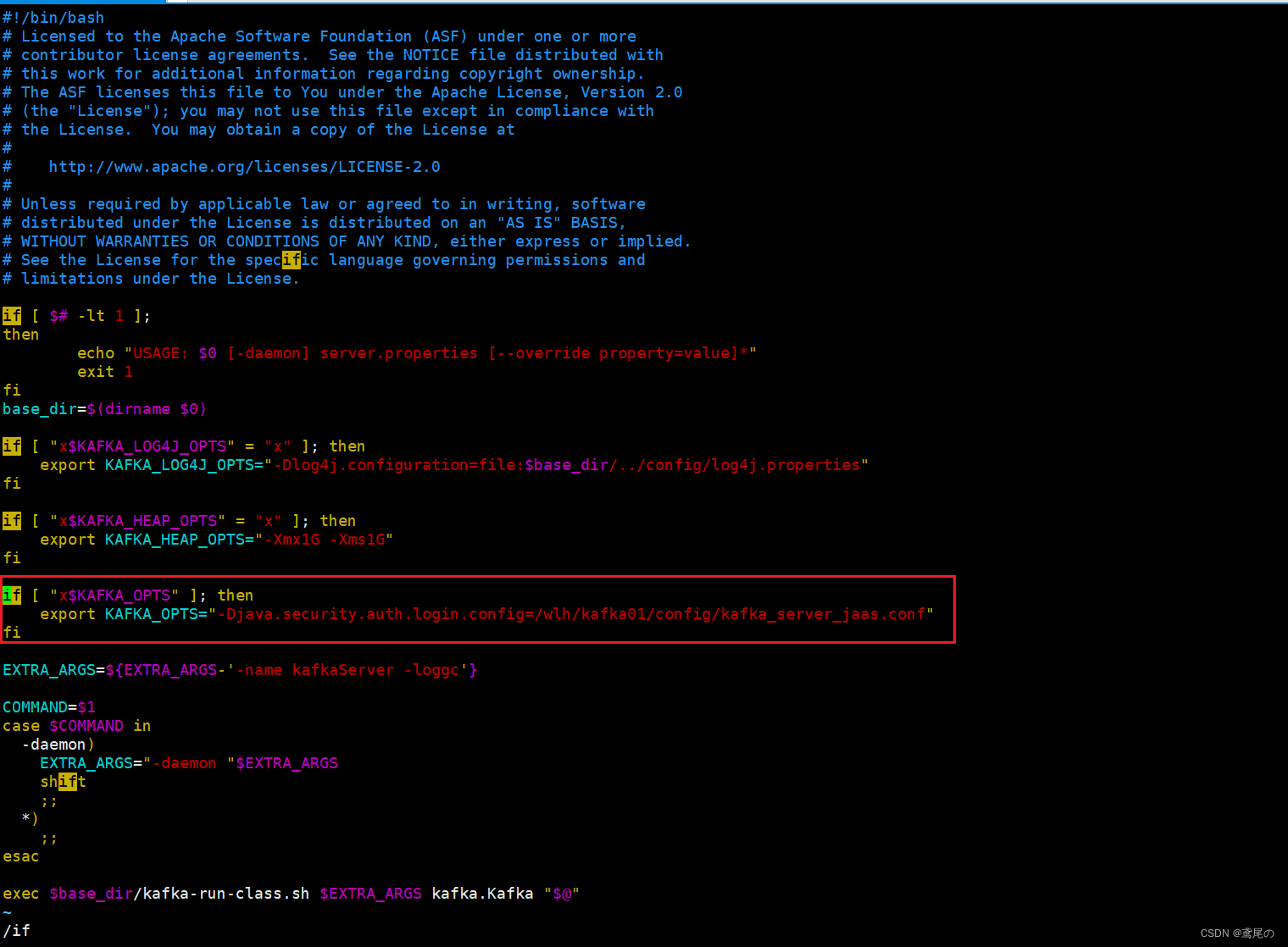上面设置好sasl认证的配置后,我们需要在kafka启动的服务脚本中,将此配置加入进去。
可以直接修改bin/kafka-server-start.sh,亦或者拷贝一份kafka-server-start.sh命名为kafka-server-start-saal.sh(名称自定义即可)

export KAFKA\_OPTS="-Djava.security.auth.login.config=/wlh/kafka01/config/kafka\_server\_jaas.conf"
kafka02和kafka03同样这样配置好
export KAFKA\_OPTS="-Djava.security.auth.login.config=/wlh/kafka02/config/kafka\_server\_jaas.conf"
export KAFKA\_OPTS="-Djava.security.auth.login.config=/wlh/kafka03/config/kafka\_server\_jaas.conf"
开始执行启动kafka集群
# 生成一个uuid,后面需要用
/wlh/kafka01/bin/kafka-storage.sh random-uuid
# 格式化存储
/wlh/kafka01/bin/kafka-storage.sh format -t xtzWWN4bTjitpL3kfd9s5g -c /wlh/kafka01/config/kraft/server.properties
/wlh/kafka02/bin/kafka-storage.sh format -t xtzWWN4bTjitpL3kfd9s5g -c /wlh/kafka02/config/kraft/server.properties
/wlh/kafka03/bin/kafka-storage.sh format -t xtzWWN4bTjitpL3kfd9s5g -c /wlh/kafka03/config/kraft/server.properties
开始启动kafka(-daemon后台启动)
# 分别启动它们
/wlh/kafka01/bin/kafka-server-start-saal.sh -daemon /wlh/kafka01/config/kraft/server.properties
/wlh/kafka02/bin/kafka-server-start-saal.sh -daemon /wlh/kafka02/config/kraft/server.properties
/wlh/kafka03/bin/kafka-server-start-saal.sh -daemon /wlh/kafka03/config/kraft/server.properties

服务启动完成。。。
Tip:服务器端口要打开,服务器端口要打开,端口打开!!!或者关了防火墙也行。
使用java进行连接
无论是使用kafka的API还是直接使用spring集成kafka都是可以的。
我这里就采用kafka的API方式了。
导入kafka-clients依赖
<dependency>
<groupId>org.apache.kafka</groupId>
<artifactId>kafka-clients</artifactId>
<version>2.7.2</version>
</dependency>
在application.properties中配置相关属性,注意spring.kafka.jaas-config是结尾是有一个分号;的,若不写,是连接不到kafka的。
spring.kafka.bootstrap-servers=192.168.8.122:19092,192.168.8.122:29092,192.168.8.122:39092
spring.kafka.jaas-config=org.apache.kafka.common.security.plain.PlainLoginModule required username="kafka" password="kafka1234";
spring.kafka.topics=test
在java配置类中进行接收并且创建生产者和消费者
package xxx.xxx.xxx;
import org.apache.kafka.common.config.SaslConfigs;
import org.apache.kafka.common.security.auth.SecurityProtocol;
import org.springframework.beans.factory.annotation.Value;
import org.springframework.boot.autoconfigure.condition.ConditionalOnProperty;
import org.springframework.stereotype.Component;
import java.util.Properties;
/\*\*
\* @author wlh
\* @date 2023/8/10
\*/
@ConditionalOnProperty("spring.kafka.bootstrap-servers")
@Component
public class KafkaProperties {
@Value("${spring.kafka.bootstrap-servers}")
private String bootstrapServer;
@Value("${spring.kafka.jaas-config}")
private String jaasConfig;
public static String topics;
@Value("${spring.kafka.topics}")
private void setTopics(String topics) {
KafkaProperties.topics = topics;
}
/\*\*
\* 获取生产者配置
\*
\* @return 配置信息
\*/
public Properties getProducerProperties() {
Properties properties = new Properties();
properties.put("bootstrap.servers", bootstrapServer);
String SERIALIZER = "org.apache.kafka.common.serialization.StringSerializer";
properties.put("key.serializer", SERIALIZER);
properties.put("value.serializer", SERIALIZER);
fillSecurityProperties(properties);
return properties;
}
// 消费者配置
public Properties getConsumerProperties() {
Properties properties = new Properties();
properties.put("bootstrap.servers", bootstrapServer);
properties.put("group.id", "test"); // group.id可以自定义
String DESERIALIZER = "org.apache.kafka.common.serialization.StringDeserializer";
properties.put("key.deserializer", DESERIALIZER);
properties.put("value.deserializer", DESERIALIZER);
fillSecurityProperties(properties);
return properties;
}
// 安全认证的配置
private void fillSecurityProperties(Properties properties) {
properties.setProperty("security.protocol", SecurityProtocol.SASL\_PLAINTEXT.name);
String SASL\_MECHANISM = "PLAIN";
properties.put(SaslConfigs.SASL\_MECHANISM, SASL\_MECHANISM);
properties.put(SaslConfigs.SASL\_JAAS\_CONFIG, jaasConfig);
}
}
创建生产者和消费者
package xxx.xxx.xxx;
import lombok.RequiredArgsConstructor;
import lombok.extern.slf4j.Slf4j;
import org.apache.kafka.clients.consumer.KafkaConsumer;
import org.apache.kafka.clients.producer.KafkaProducer;
import org.springframework.boot.autoconfigure.condition.ConditionalOnProperty;
import org.springframework.context.annotation.Bean;
import org.springframework.context.annotation.Configuration;
import java.util.Arrays;
import java.util.Collections;
import java.util.List;
/\*\*
\* @author wlh
\* @date 2023/08/10
\*/
@ConditionalOnProperty("spring.kafka.bootstrap-servers")
@Slf4j
@RequiredArgsConstructor
@Configuration
public class KafkaConfig {
private final KafkaProperties kafkaProperties;
// 创建生产者
@Bean
public KafkaProducer<String, String> kafkaProducer() {
return new KafkaProducer<>(kafkaProperties.getProducerProperties());
}
// 创建消费者
@Bean
public KafkaConsumer<String, String> kafkaConsumer() {
KafkaConsumer<String, String> kafkaConsumer = new KafkaConsumer<>
(kafkaProperties.getConsumerProperties());
List<String> topicList = Collections.singletonList("test"); // 这里写死了,可自行扩展
kafkaConsumer.subscribe(topicList);
log.info("消息订阅成功! topic:{}", topicList);
log.info("消费者配置:{}", kafkaProperties.getConsumerProperties().toString());
return kafkaConsumer;
}
}
信息发送的Util工具类
package xxx.xxx.xxx;
import com.alibaba.excel.util.StringUtils;
import com.alibaba.fastjson.JSON;
import lombok.extern.slf4j.Slf4j;
import org.apache.kafka.clients.producer.KafkaProducer;
import org.apache.kafka.clients.producer.ProducerRecord;
import org.springframework.beans.factory.annotation.Autowired;
import org.springframework.scheduling.annotation.Async;
import org.springframework.stereotype.Component;
import java.util.Arrays;
import java.util.Collections;
import java.util.List;
@Component
@Slf4j
public class KafkaSendUtil {
@Autowired
KafkaProducer<String, String> kafkaProducer;
@Async
public void sendMsg(String topic, String msg) {
List<String> topics;
if (StringUtils.isBlank(topic)) {
topics = Arrays.asList(KafkaProperties.topics.split(","));
} else {
topics = Collections.singletonList(topic);
}
for (String sendTopic : topics) {
ProducerRecord<String, String> record = new ProducerRecord<>(sendTopic, msg);
log.info("正在发送kafka数据,数据=====>{}", msg);
kafkaProducer.send(record);
}
}
}
实例
简单做一个实例,调通一下数据。监听方式可以不按照本文的,本文只是做测试。
kafka消费者监听器
package xxx.xxx.xxx;
import lombok.extern.slf4j.Slf4j;
import org.springframework.boot.ApplicationArguments;
import org.springframework.boot.ApplicationRunner;
import org.springframework.stereotype.Component;
import java.util.Arrays;
import java.util.concurrent.ExecutorService;
import java.util.concurrent.Executors;
@Slf4j
@Component
public class KafkaListener implements ApplicationRunner {
public static ExecutorService executorService = Executors.newFixedThreadPool(2);
@Override
public void run(ApplicationArguments args) {
log.info("监听服务启动!");
executorService.execute(() -> {
MessageHandler kafkaListenMessageHandler = SpringBeanUtils.getBean(MessageHandler.class);
kafkaListenMessageHandler.onMessage(SpringBeanUtils.getBean("kafkaConsumer"), Arrays.asList("test")); // 这里是监听的kafka的topic,这里写死了,自己扩展即可
});
}
}
Bean的工具类
package com.bjmetro.top.global.kafka;
import org.springframework.beans.BeansException;
import org.springframework.context.ApplicationContext;
import org.springframework.context.ApplicationContextAware;
import org.springframework.stereotype.Component;
@SuppressWarnings("unchecked")
@Component
public class SpringBeanUtils implements ApplicationContextAware {
private static ApplicationContext applicationContext;
@Override
public void setApplicationContext(ApplicationContext applicationContext) throws BeansException {
SpringBeanUtils.applicationContext = applicationContext;
}
public static <T> T getBean(String beanName) {
if (applicationContext.containsBean(beanName)) {
return (T) applicationContext.getBean(beanName);
} else {
return null;
}
}
public static <T> T getBean(Class<T> clazz) {
return applicationContext.getBean(clazz);
}
}
消费者处理消息
package com.bjmetro.top.global.kafka;
import lombok.extern.slf4j.Slf4j;
import org.apache.kafka.clients.consumer.ConsumerRecord;
import org.apache.kafka.clients.consumer.ConsumerRecords;
import org.apache.kafka.clients.consumer.KafkaConsumer;
import org.springframework.stereotype.Component;
import java.nio.charset.StandardCharsets;
import java.util.List;
@Slf4j
@Component
public class MessageHandler {
void onMessage(KafkaConsumer kafkaConsumer, List<String> topic) {
log.info("队列开始监听:topic {}", topic);
while (true) {
ConsumerRecords<String, String> records = kafkaConsumer.poll(1000);
for (ConsumerRecord<String, String> record : records) {
log.info("partition:{} offset = {}, key = {}, value = {}", record.partition(), record.offset(), record.key(), record.value());
try {
String messageData = new String(record.value().getBytes(), StandardCharsets.UTF\_8);
System.out.println("收到消息:" + messageData);
} catch (Exception e) {
log.error("消息处理异常");
}
}
}
}























 2915
2915

 被折叠的 条评论
为什么被折叠?
被折叠的 条评论
为什么被折叠?








